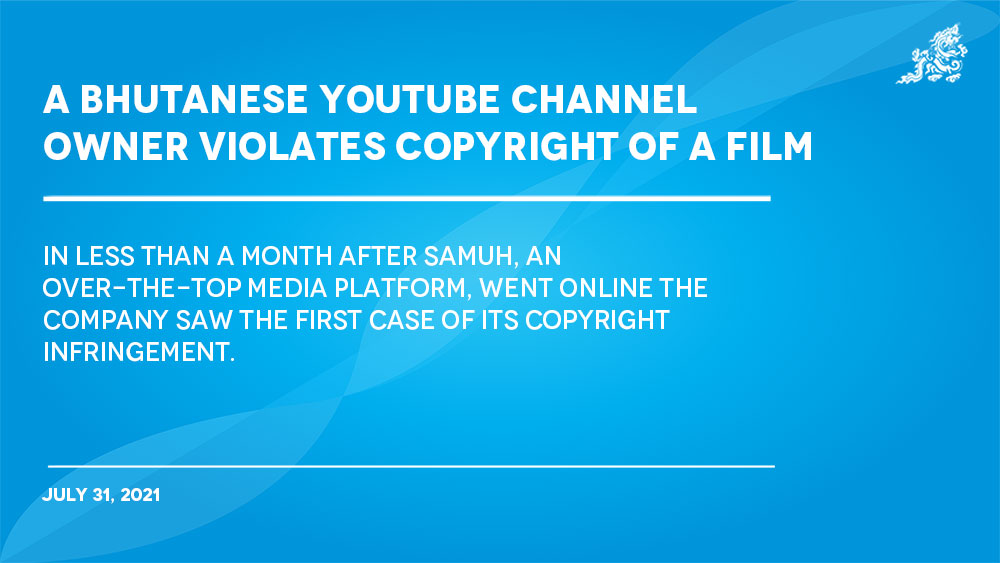Chhimi Dema
In less than a month after Samuh, an over-the-top media platform, went online the company saw the first case of its copyright infringement.
The copyright violation case was reported to the police on July 22 against a Bhutanese YouTube channel for streaming their film Pot of Gold on the YouTube channel. Samuh is the film’s legal owner and copyright holder.
On July 21, Samuh commented on the video post asking the owner to remove it and reported to YouTube. The video was removed by YouTube the next day for violating copyrights.
The Copyright Act of Kingdom of Bhutan 2001 protects the rights of literary and artistic works which includes writings, oral works, stage productions, and audiovisual works, among others.
The Act states that the infringer shall be entitled to the payment of damages for the prejudices suffered and expenses caused by infringement, including legal costs.
“Any infringement of a right protected under this Act, if committed wilfully, or by gross negligence, and for profit-making purposes, shall be punishable by imprisonment for a period of up to one year of by a fine of up to Nu 1000,000 or by both,” stated the Act.
According to Samuh’s complaint letter filed to the police, a YouTube account uploaded the recorded version of Pot of Gold on its channel which was recorded when the film was aired on Bhutan Broadcasting Service during the nationwide lockdown.
The film Pot of Gold was uploaded by the account in two parts–part one was uploaded on July 18 and part two was uploaded on July 20, the complaint letter stated. The YouTube channel also used Samuh’s poster as the thumbnail of the YouTube post.
The complaint letter stated that considering the timing of the film streamed on YouTube which coincided with the release on Samuh’s weekend cinema segment, the intention of the person was “clearly malicious in nature and to harm [Samuh’s] business.”
It has harmed the business since part one of the film streamed on YouTube had 3,500 views and part two had 1,000 views on July 22, the complaint letter stated.
Samuh’s chief executive officer, Nyema Zam, said that protecting copyright was important for the company because of the company’s involvement with a lot of people working in the creative industry.
“We are not just talking about one film, we have hundreds of films on our platform, and some of the content that we show is exclusive on Samuh,” she said, adding that realising this, the company put in place a zero-tolerance policy towards piracy.
Samuh identified the owner of the YouTube channel, Nyema Zam said, the details of the person are shared with the police and now they were waiting for a written statement from the YouTube account holder.
“There is a rampant need for advocacy on intellectual property rights. People need to know the repercussion of what happens to themselves, and how it affects the business,” she said.
The police and the intellectual property rights department need to work together for intellectual property rights implementation, she added.
Edited by Tshering Palden


